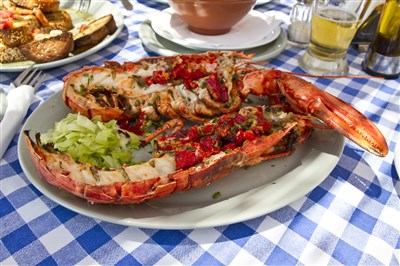
Restaurants haven't had a great run of things throughout coronavirus, and Darden Restaurants (NYSE:DRI) was no exception. The lockdowns and restrictions—some of which are still in place a year later—hit dining rooms hard, and take-out and delivery options often weren't enough to close the gap fully. Some restaurants, however, carried on, and came out the other side, which is pretty much what happened with Darden Restaurants' latest earnings report.
No Leftovers Here
The news was almost completely good coming out of Darden, as it issued beats for both earnings per share and revenue. The company brought in quarterly earnings of $0.98 per share, which compares marvelously against the expected $0.69 figure the consensus brought out. As for revenue, there was a similar win there, as the company brought in $1.73 billion against an expected $1.63 billion.
However, not all that surprisingly, the comparisons between this year in revenue and last year were less than impressive. The company's third-quarter earnings of $128.7 million was down almost half from the same time the previous year, which brought in $232.3 million. Net sales were also down against the same time last year, reports noted, to the tune of around 26.1%. This came as many states took the chance to put harder lockdown measures back in place amid growth in coronavirus cases.
Impact was felt throughout the entire Darden ecosystem, but some segments were hit harder than others. For instance, Olive Garden—about half of Darden's revenue—saw its same-store sales drop 25.8%. Its fine-dining arm, including The Capital Grille, dropped 45.2%. But LongHorn Steakhouse saw sales dip just 12.6%.
Future projections, meanwhile, look brisk for Darden going forward; the company expects sales of $2.1 billion overall, and earnings per share to come in around $1.60 to $1.70. As vaccination rates improve, and states ease off the lockdown button, the end result should be more people going back to restaurants and actually being allowed to sit down.
Analysts Still Sitting Down to Devour Darden Stock
Meanwhile, the broader analyst pool—based on our latest research—points to ongoing improvement. The company is currently consensus-rated as a “buy”, and has held that rating for the last two years now and then some. The ratios comprising that consensus have changed in that time, of course, but the overall pool is still heavily in favor of loading up.
A year ago, the company had 14 “buy” ratings and eight “hold” to its credit. Six months ago, that exploded to 22 “buy” and 11 “hold”. Last month, sentiment got a little more bearish as the ratio dropped to 19 “buy” and 11 “hold”, but improved slightly with the latest figures as the company now stands at 20 “buy” and 11 “hold.”
The price target, meanwhile, has been trending steadily upward for the last year. Last year at this time, the company was down around $31 per share. Today, the average price target is a shade under four times that figure at $122.87. Even the most pessimistic outlook looks for great things from Darden; the lowest figure is $58. Though the company currently trades at $138.14, which suggests a bit of downside risk overall.
Making Big Moves, if the Training Wheels Come Off
Give Darden its due here, it's doing pretty much everything it can to stay ahead. It's heavily diversified, it has a range of brands to its credit, and it can cover just about anything anybody's got a taste for, from fish to pasta to an awesome fine dining experience. It's even making moves to ensure it's got the workers on its side; it's slated to boost wages to $10 an hour, including tips, at every one of its restaurants. In January 2022, that goes up to $11, and in January 2023, $12 an hour. That's a big deal in a field where many workers are paid less than the minimum wage and expected to make it up in tips.
That could be a bit of a problem going forward, though, as businesses scramble to raise the necessary cash required to pay such wages. Either that, or cut back on employees accordingly. If the customer experience falls through, then Darden restaurants may be an endangered species. Given that the company is phasing this in gradually over three years, though, it could provide necessary warning to pare back advances as need be.
The biggest issue, though, will be whether or not states get out of the way. The lockdowns have meant a huge hit to restaurants; carryout and delivery are additional revenue streams, not full replacements for dining in. If the vaccination rates increase, that should result in fewer case numbers, which should pull the last prop for maintaining lockdowns of any sort out with it.
Darden has made amazing strides in the last year, coming back from a market environment that's been unlike any other in the last 50 years. Whether or not it can continue its comeback depends largely on how belligerent state governments plan to be, and how allowed restaurants in general will be to function.
Companies in This Article: